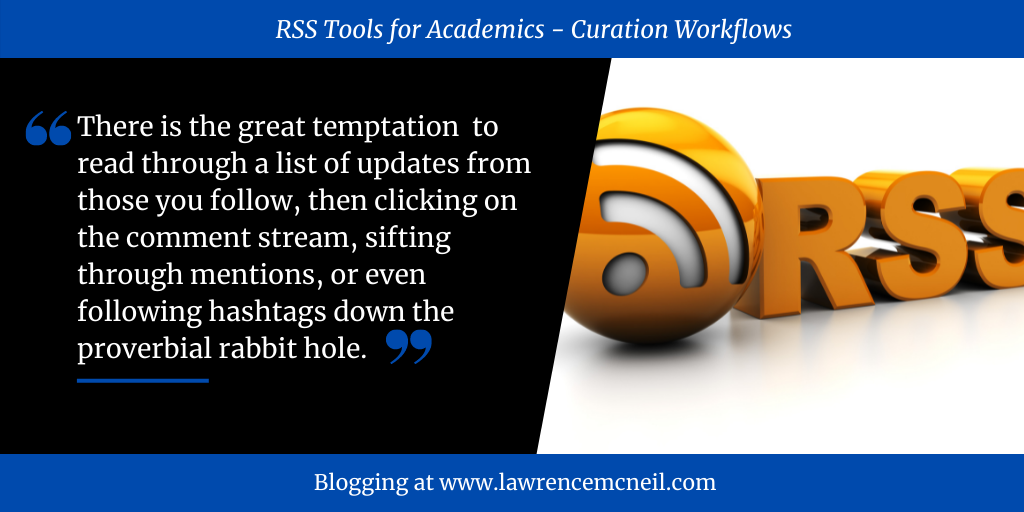|
What is RSS?
RSS stands for “really simple syndication,” which at its core is just an XML format that allows, well, simple sharing of internet content. From blogs to popular news feeds, RSS was for a time the must-have content curator for readers wanting a more focused collection of readings. I say “for a time” because RSS has been supplanted by social media options in recent years. Twitter and many third party social media aggregators like Hootsuite have the ability to curate feeds and news stories, with the added bonus of social interaction with the curated content list. For some, this is ideal. For me, this is quite distracting and hinders sustained productive consumption of the content. There is the great temptation to read through a list of updates from those you follow, then clicking on the comment stream, sifting through mentions, or even following hashtags down the proverbial rabbit hole. RSS curation prevents these distractions and creates a more ideal environment for enjoying focused updates. Regarding specific RSS tools, there are 3 I've used regularly that I recommend: Feedbin, Feedly, and Reeder. This post is not a review of these apps, as they are all well-covered throughout YouTube. I will quickly say, however, Feedbin is my favorite RSS tool, not because its features are more abundant than its competitors. I prefer Feedbin because of its very logical and appealing user interface, in addition to its many advanced features. My objective for this post is to elaborate on how I use RSS for academic curation and to demonstrate how I use them to enhance my knowledge of academic matters related to teaching, research, and higher education administration. Personal Knowledge Management (PKM) PKM is a process where individuals or organizations collect, store, manage, and share their information. This information is then leverage to impact the work individuals complete. Ideally, an effective system of PKM leads to a significant return on the investment and productivity improvements. PKM systems at the organizational level can be expensive and challenging to deploy across departments and users. There are many softwares available today to smooth this process, such as Knowledge Center and Document360. However, at the individual level, PKM can be as simple as using RSS tools for content curation for the purposes of reflection, organization, or researching matters relevant to personal growth. What to Curate and Why I categorize my feeds into three areas: innovative pedagogy, international economics, higher education administration, and educational technology. These are most relevant for my interests and career path. Yours will obviously differ depending on your own life goals. The process I use is transferable, however, in terms of workflow. Innovative Pedagogy I primarily curate website feeds from leading edge teachers and thinkers in this space. Tools like Feedbin only need a website link and it will automatically search for the relevant RSS feeds which it extracts from the website. For example, if you add the main link from Teaching in Higher Ed into Feedbin’s portal, it will auto-find the Teaching in Higher Ed RSS feed and import the latest blog content from the website. Trying this with the Cult of Pedagogy or Ditch That Textbook will yield similar results. Additional sources of excellent innovative pedagogy content include: Lecture Breakers Top of Mind Research and Science Journals A second critical source of interest are research journals. Times have certainly evolved in academia from the requirement of long hours pacing through vacuous rows of Dewey-decimaled library stacks. While nostalgic, these experiences have been replaced by online deep dives into thousands of journal options. Name the topic and there’s a journal or hundreds dedicated to said topic’s micro and macro-level mechanics. What’s so fascinating about RSS curation is that you can create a list of your favorite journals, categorized by subtopic if you like, and simply review the list periodically to uncover new articles, reports, and other intellectual offerings. A few sources of the latest academic writings related to higher education administration include: Journal of Higher Education Policy and Management Journal of Higher Education Twitter and Social Media For educational technology resources and information, there is no better place than Twitter. One has to be careful, however, due to the reasons discussed earlier. Twitter and social media generally can be a massively unproductive experience. RSS curation tools like Feedbin are extremely valuable in their ability to require users to select which handles to follow, then groups handles into user-categorized folders. Feedbin’s other valuable feature that improves focused reading is how it displays social content. Twitter feeds shown in Feedbin are limited to the tweet itself and not the related comments, likes, retweets, or shares. Rabbit hole avoided. Some services like Feedly don't have these integrations with social media platforms, but they still do a good job at ensuring a focused reading experience.
0 Comments
Leave a Reply. |

 RSS Feed
RSS Feed